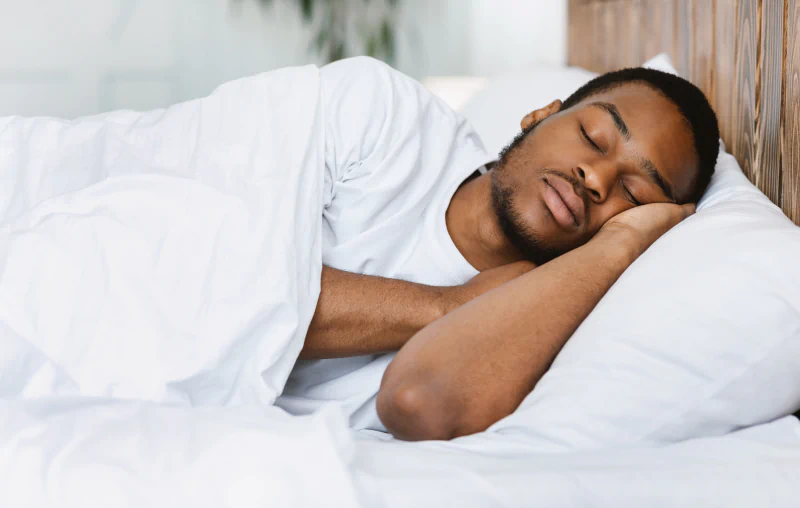GET MORE FROM YOUR MATTRESS
(AND YOUR MONEY)
Sign up for Email Updates!
- Discounts
- Tips
- Latest News
- New Products
This December, every mattress purchase donates a bed to a Houston child in need. Save up to 40% off mattresses with free delivery on select mattresses! Details.
Copyright © 2025. Texas Mattress Makers.
May 14, 2024 · 8 min read

For many individuals, getting a good night’s sleep is difficult. If you often feel tired during the day, you could be dealing with sleep problems. Because sleep is crucial for our overall health and well-being, the quality of your sleep matters. So, how do you fix sleep problems?
Our mattress experts are here to share the solutions to this list of sleep problems:
To get the quality rest you deserve, you must uncover the root causes of your sleep problems and go from there. Once you have your answers, our mattress experts can help you find the right mattress and accompanying accessories to address your bad sleep symptoms and give you a great night’s sleep. The right mattress and accessories can avoid the most common sleep problems.
Insomnia is a sleep disorder where someone has difficulty falling or staying asleep almost every night. Insomnia is one of the most common sleep disorders in adults and can be caused by stress, anxiety, depression, poor lifestyle habits, underlying health issues, family history, or other factors. Here are a few ways to maintain insomnia symptoms and get better sleep.
A great way to combat insomnia is to create a relaxing and comfortable sleep environment to help your mind and body rest. The best place to start is with your mattress. While insomnia can stem from biological factors, it can also be triggered by an uncomfortable mattress. Check out our blog discussing the signs you need a new mattress to know if your bed needs replacing. Having the right mattress to support your body and deliver the comfort you need can help you get the rest you need.
Once you have your perfect mattress, establish a relaxing and cozy bedtime routine to relieve stress and prepare your mind for sleep.
Persistent insomnia may require professional help. Seeing a sleep professional can help you determine the severity of your insomnia, root causes, and possible treatment routes. Medication can be prescribed to help you fall and stay asleep.

The Mattress You Deserve
Obstruction sleep apnea is a sleep disorder where breathing repeatedly stops and starts during sleep due to the relaxation of throat muscles. This disruption can lead to loud snoring, daytime sleepiness, and other health problems. If left untreated, sleep apnea can be dangerous to your health. Your mattress can play a large role in bettering your sleep apnea.
If you’re searching for the best bed for sleep apnea, there are a few factors to keep in mind when choosing a mattress.
Finding the right mattress comfort level is essential for combatting sleep apnea. A mattress that’s too soft might make you sink in, which can affect your breathing, while one that’s too firm might not keep your spine aligned and could be uncomfortable. A balance of the two is preferable, making a medium-feel mattress a great choice. However, your body type and how you sleep also play a role in finding the right firmness. If you’re not sure, talk to our mattress experts — they’ll help you find the perfect comfort level.
When you lie flat on a mattress, your airways can more easily become blocked, leading to loud snoring or difficulty breathing. Therefore, many people with sleep apnea can benefit from an adjustable bed. An adjustable base allows you to move your head or legs up and down until you find a comfortable position while opening up your airways. This investment will not only improve your sleep quality and your sleep apnea symptoms but it can also elevate your sleep experience.
Sleep deficiency, also known as sleep deprivation, happens when a person is not getting enough sleep per night or is not getting quality sleep. Functioning day-to-day on a lack of sleep can impact your health negatively and can be dangerous in some cases. Here are the signs that you’re not getting enough sleep:
Sleep deficiency impairs your ability to think, react, work, and interact with others. It doesn’t matter if you’re getting the recommended 7-9 hours of sleep every night if you’re not getting deep sleep. Eight hours of tossing and turning is just as bad as getting only a few hours of deep sleep. Some couples even end up getting what they call a “sleep divorce” that results in sleeping in separate beds due to their partners keeping them up at night.
To combat sleep deficiency, you need to address the root cause of your sleep disruptions. For many sleepers, the key to getting a good night’s sleep is to invest in a quality mattress, stick to a bedtime routine, and avoid technology, caffeine, or other stimulants before bed.
Another thing to consider is your overall comfort. If you’re waking up with aches and pains, it’s time to get a new mattress. Texas Mattress Makers can help you find the best mattress for back pain, hip pain, shoulder pain, and more. The right components will keep your body comfortable and provide pressure point relief for pain-free sleep.
“We’ve had our new mattress for a while now, and apart from sleeping better, our back pain has completely disappeared. I can recommend these mattresses with absolutely no reservations.”
Robin B.
Our “circadian rhythm” is our body’s internal clock that regulates our sleep cycle. It tells us when it is time to go to bed and when to wake up. Disruptions to this rhythm, such as daylight savings, time shifts, jet lag, or irregular sleep patterns, can lead to circadian rhythm disorders. Having a circadian rhythm disorder means that you experience difficulty falling asleep or staying asleep at the desired times.
Keeping a consistent sleep schedule is key to realigning your circadian rhythm. This means going to bed and waking up at the same time every day… even on weekends. You’ll also want to expose yourself to plenty of natural light during the day (especially in the morning) to keep yourself awake and alert until it’s time to wind down in the evening. This can help combat daytime sleepiness. Be sure to avoid stimulants before bed, such as caffeine, alcohol, and nicotine, so your brain can begin producing melatonin at the proper time.
Having a quality mattress that supports and accommodates your body will help you fall and stay asleep for longer, uninterrupted sleep.
Waking up drenched in sweat is not only uncomfortable — it’s a surefire way to derail your rest. Night sweats, or excessive sweating during sleep, are often caused by hormonal changes, medications, or medical conditions like menopause. Unfortunately, blasting the AC or buying cooling gel mattress toppers will only cause you more financial and sleep-related problems.
To manage night sweats properly, opt for a mattress with breathable materials. The best mattress for night sweats will feature cooling technology and components such as latex or gel-infused memory foam, which can help dissipate heat and wick away moisture.
Our cooling mattresses feature our Ice Blue Cooling Technology designed to regulate your body temperature so heat doesn’t get trapped into your mattress. Unlike cooling gels or other gimmicks, our cooling toppers keep you cool and comfortable throughout the night — not just for a few hours.
The most common sleep problems can be brought on by a mix of psychological, environmental, and physical factors that disrupt the body’s natural sleep cycle. The root causes can vary case-by-case.
Recognizing these factors is the first step to fixing sleep issues and getting better rest. Take that first step with Texas Mattress Makers.
The most common sleep problems we see in customers can be remedied with the right mattress. Pain, snoring, and other factors that cause disruptive sleep can be signs of a bad mattress that needs replacing. Once you have the perfect mattress for your body and unique needs, you’ll be able to get a good night’s sleep every night.
Don’t let sleep problems disrupt your life any longer — make the investment in your sleep health today! Visit any of our Houston-area mattress stores to try our top-quality mattresses in person. With an expert by your side, we can find a bed that works perfectly for you (and a partner!). Say goodbye to your sleep troubles when you shop with Texas Mattress Makers.
More Helpful Articles by Texas Mattress Makers: